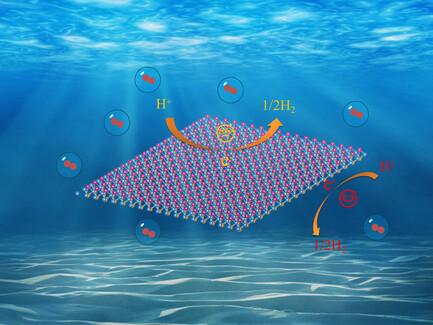Unlocking Quantum Catalysis in Topological Trivial Materials: A Case Study of Janus Monolayer MoSMg
IF 11.1
Q1 MATERIALS SCIENCE, MULTIDISCIPLINARY
引用次数: 0
Abstract
The emerging field of topological catalysis has received significant attention due to its potential for high-performance catalytic activity in the hydrogen-evolution reaction (HER). While topological materials often possess fragile surface states, trivial topological materials not only offer a larger pool of candidates but also demonstrate robust surface states. As a result, the search for topological catalysts has expanded to include trivial schemes. In this study, a novel 2D Janus monolayer, MoSMg, which demonstrates exceptional obstructed atomic insulating behavior, is presented. Crucially, this trivial metallic topological state exhibits clean obstructed surface states, leading to a significant enhancement in catalytic performance for the HER in electrochemical processes, particularly under high hydrogen coverage. Moreover, the edge sites of this MoSMg monolayer exhibit even more superior catalytic activity, characterized by near-zero Gibbs free energies. In these findings, the way is paved for exploring new avenues in the design of quantum electrocatalysts, especially within the realm of trivial topological materials.

开启拓扑三维材料的量子催化:杰纳斯单层 MoSMg 案例研究
拓扑催化这一新兴领域因其在氢进化反应(HER)中具有高性能催化活性的潜力而备受关注。拓扑材料通常具有脆弱的表面态,而琐碎拓扑材料不仅提供了更多的候选材料,而且还表现出稳健的表面态。因此,拓扑催化剂的研究已扩展到琐碎方案。本研究介绍了一种新型二维简纳斯单层材料--MoSMg,它表现出非凡的受阻原子绝缘行为。最重要的是,这种琐碎的金属拓扑态表现出了干净的受阻表面态,从而显著提高了电化学过程中 HER 的催化性能,尤其是在高氢气覆盖的情况下。此外,MoSMg 单层的边缘位点表现出更卓越的催化活性,其特征是吉布斯自由能接近于零。这些发现为探索量子电催化剂设计的新途径铺平了道路,尤其是在三维拓扑材料领域。
本文章由计算机程序翻译,如有差异,请以英文原文为准。
求助全文
约1分钟内获得全文
求助全文
来源期刊
CiteScore
14.00
自引率
2.40%
发文量
0
期刊介绍:
Small Science is a premium multidisciplinary open access journal dedicated to publishing impactful research from all areas of nanoscience and nanotechnology. It features interdisciplinary original research and focused review articles on relevant topics. The journal covers design, characterization, mechanism, technology, and application of micro-/nanoscale structures and systems in various fields including physics, chemistry, materials science, engineering, environmental science, life science, biology, and medicine. It welcomes innovative interdisciplinary research and its readership includes professionals from academia and industry in fields such as chemistry, physics, materials science, biology, engineering, and environmental and analytical science. Small Science is indexed and abstracted in CAS, DOAJ, Clarivate Analytics, ProQuest Central, Publicly Available Content Database, Science Database, SCOPUS, and Web of Science.

 求助内容:
求助内容: 应助结果提醒方式:
应助结果提醒方式:


